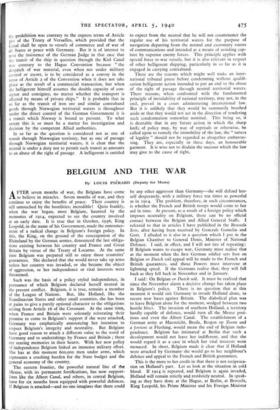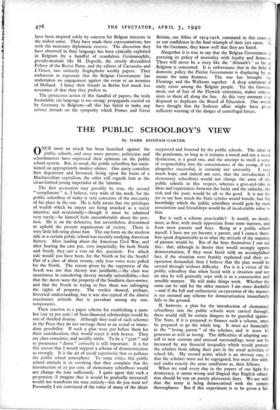BELGIUM AND THE WAR
By LOUIS PIERARD (Deputy for Mons)
AFTER seven months of war, the Belgians have come to believe in miracles. Seven months of war, and they continue to enjoy the benefits of peace. Their country is still untouched by the hostilities; incredible! Quite frankly, when the war began, most Belgians, haunted by the memories of 1914, expected to see the country involved at an early date. It is true that in October, 1936, King Leopold, in the name of his Government, made the announce- ment of a radical change in Belgium's foreign policy. In this, the King, on the ground of the reoccupation of the Rhineland by the German armies, denounced the last obliga- tions existing between his country and France and Great Britain by virtue of the Treaty of Locarno. At the same time Belgium was prepared still to enjoy those countries' guarantees. She declared that she would never take up arms unless her country was invaded, or she became the object of aggression, or her independence or vital interests were threatened.
Such was the basis of a policy styled independence, in pursuance of which Belgium declared herself neutral in the present conflict. Belgium, it is true, remains a member of the League of Nations. But, like Holland, like the Scandinavian States and other small countries, she has been at pains to give a purely optional character to the obligations arising from Article 16 of the Covenant. At the same time, when France and Britain were solemnly reiterating their promise to come to Belgium's support if she were attacked, Germany was emphatically announcing her intention to respect Belgium's integrity and neutrality. But Belgians have good reason to attach a different value to the word of Germany and to undertakings by France and Britain ; there are searing memories in their hearts. With her new policy of independence Belgium linked an immense military effort. She has at this moment 600,00o men under arms, which represents a crushing burden for the State budget and the general economy of the country.
The eastern frontier, the powerful natural line of the Meuse, with its permanent fortifications, has now support- lines like the Albert Canal, and others, in central Belgium, have for six months been equipped with powerful defences. If Belgium is attacked—and no one imagines that there could be any other aggressor than Germany—she will defend her- self desperately, with a military force ten times as powerful as in 1914. The problem, therefore, in such circumstances, is whether the French and British troops would come to her aid in time. At present, as a result of a foreign policy which imposes neutrality on Belgium, there can be no official contact between the Belgian and Allied General Staffs. I referred to that in articles I have published in the Brussels Soir, after having been received by Generals Gamelin and Gort. I alluded to it also in a question which I put in the Belgian Chamber to General Denis, Minister of National Defence. I said, in effect, and I will not tire of repeating: If Belgium wants to escape war, Germany must realise that at the moment when the first German soldier sets foot on Belgian or Dutch soil appeal will be made to the French and British guarantees, and those Powers must intervene at lightning speed. If the Germans realise that, they will fall back as they fell back in November and in January.
I said : On Belgian or Dutch soil. It must be realised that since the November alarm a decisive change has taken place in Belgium's policy. There is no question that at this moment it would suit Germany to invade Holland alone, to secure new bases against Britain. The diabolical plan was to leave Belgium alone for the moment, wedged between two hostile blocs. The invasion of southern Holland, a territory hardly capable of defence, would turn all the Meuse posi- tions and even the Albert Canal. The establishment of a German army at Maestricht, Breda, Bergen op Zoom and a fortiori at Flushing, would mean the end of Belgian inde- pendence. Belgium has intimated at Berlin that such a development would not leave her indifferent, and that she would regard it as a case in which her vital interests were menaced. In short, Belgium made it clear that if Holland were attacked by Germany she would go to her neighbour's defence and appeal to the French and British guarantees.
This is the more to her credit in that there is not reciproca- tion on Holland's part. Let us look at the situation in cold blood. If 1914 is repeated, and Belgium is again invaded, Holland will remain strictly and resblutely neutral. In speak- ing as they have done at the Hague, at Berlin, at Brussels, King Leopold, his Prime Minister and his Foreign Minister have been inspired solely by concern for Belgian interests in the widest sense. They have made their representations, but with the necessary diplomatic reserve. The discretion they have observed in their language has been cynically exploited in Belgium by a handful of scandalous Germanophils, pseudo-neutrals like M. Degrelle, the utterly discredited Fiihrer of the Rexist Party, and the editors of Cassandre and L'Oeust, two violently Anglophobe weekly papers. They endeavour to represent that the Belgian Government has undertaken no engagement against the event of an invasion of Holland. I fancy their friends in Berlin feel much less assurance of that than they profess to.
The pernicious action of this handful of papers, the truly formidable (no language is too strong) propaganda carried on by Germany in Belgium—all this has failed to make any serious inroads on the sympathy which France and Great Britain, our Allies of 1914-1918, command in this country, or our confidence in the final triumph of their just cause. As for the Germans, they know well that they are hated.
Altogether it is true to say that the Belgian Government is pursuing its policy of neutrality with loyalty and firmness. There will never be a story like the Altmark's ' so far as Belgium is concerned. It is unfortunate that in the field of domestic policy the Pierlot Government is displaying by no means the same firmness. The war has brought the Flemings and the Walloons together. A deep sentiment of unity exists among the Belgian people. Yet the Govern. ment, out of fear of the Flemish extremists, makes conces- sions to them all along the line. At this very moment it is disposed to duplicate the Board of Education. One would have thought that the Sudeten affair might have given sufficient warning of the danger of centrifugal forces.















































 Previous page
Previous page